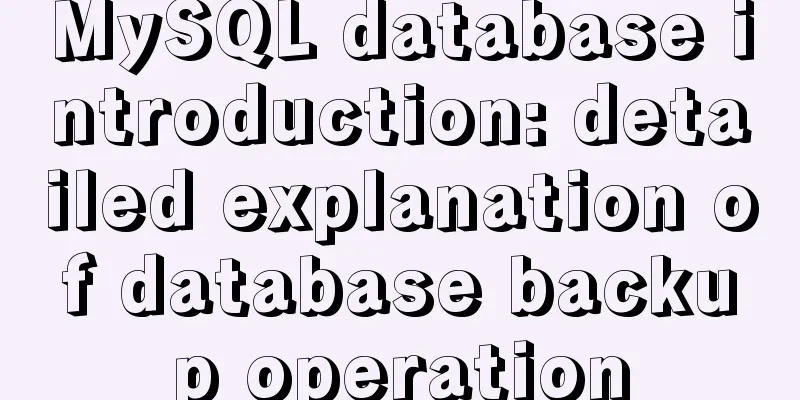MySQL database introduction: detailed explanation of database backup operation

|
This article uses an example to explain the operation of backing up the database in the MySQL database. Share with you for your reference, the details are as follows: Continuing from the last time: Getting started with MySQL database multi-instance configuration When it comes to data, everyone will be very nervous. There are many types of data, but in general, data is very important. Therefore, daily data backup work has become the focus of the focus of operation and maintenance work................. First, let's take a look at the data in the database mysql> select * from test; +-----+------+ | id | name | +-----+------+ | 1 | 1 | | 11 | text | | 21 | abc | | 9 | bcd | | 111 | 1 | | 441 | text | | 41 | abc | | 999 | bcd | +-----+------+ 8 rows in set (0.00 sec) 1. Single database backup[root@centos6 ~]# mysqldump -uroot -p test >/download/testbak_$(date +%F).sql Enter password: [root@centos6 ~]# ll /download/ total 2 -rw-r--r--. 1 root root 1888 Dec 12 20:34 testbak_2016-12-12.sql Let's take a look at what this backup file contains. [root@centos6 ~]# egrep -v "^--|\*|^$" /download/testbak_2016-12-12.sql DROP TABLE IF EXISTS `test`; CREATE TABLE `test` ( `id` int(4) NOT NULL, `name` char(20) NOT NULL )ENGINE=MyISAM DEFAULT CHARSET=latin1; LOCK TABLES `test` WRITE; INSERT INTO `test` VALUES (1,'1'),(11,'text'),(21,'abc'),(9,'bcd'),(111,'1'),(441,'text'),(41,'abc'),(999,'bcd'); UNLOCK TABLES; From the above file content, we can see that the actual process of this backup is to back up the SQL statements for creating databases, building tables, and inserting data. It can also be said that the SQL statements are exported. -B parameter [root@centos6 ~]# mysqldump -uroot -p -B test >/download/testbak_$(date +%F)_b.sql Enter password: [root@centos6 ~]# egrep -v "^--|^$" /download/testbak_2016-12-12_b.sql /*!40101 SET @OLD_CHARACTER_SET_CLIENT=@@CHARACTER_SET_CLIENT */; /*!40101 SET @OLD_CHARACTER_SET_RESULTS=@@CHARACTER_SET_RESULTS */; /*!40101 SET @OLD_COLLATION_CONNECTION=@@COLLATION_CONNECTION */; /*!40101 SET NAMES utf8 */; /*!40103 SET @OLD_TIME_ZONE=@@TIME_ZONE */; /*!40103 SET TIME_ZONE='+00:00' */; /*!40014 SET @OLD_UNIQUE_CHECKS=@@UNIQUE_CHECKS, UNIQUE_CHECKS=0 */; /*!40014 SET @OLD_FOREIGN_KEY_CHECKS=@@FOREIGN_KEY_CHECKS, FOREIGN_KEY_CHECKS=0 */; /*!40101 SET @OLD_SQL_MODE=@@SQL_MODE, SQL_MODE='NO_AUTO_VALUE_ON_ZERO' */; /*!40111 SET @OLD_SQL_NOTES=@@SQL_NOTES, SQL_NOTES=0 */; CREATE DATABASE /*!32312 IF NOT EXISTS*/ `test` /*!40100 DEFAULT CHARACTER SET latin1 */; USE `test`; DROP TABLE IF EXISTS `test`; /*!40101 SET @saved_cs_client = @@character_set_client */; /*!40101 SET character_set_client = utf8 */; CREATE TABLE `test` ( `id` int(4) NOT NULL, `name` char(20) NOT NULL )ENGINE=MyISAM DEFAULT CHARSET=latin1; /*!40101 SET character_set_client = @saved_cs_client */; LOCK TABLES `test` WRITE; /*!40000 ALTER TABLE `test` DISABLE KEYS */; INSERT INTO `test` VALUES (1,'1'),(11,'text'),(21,'abc'),(9,'bcd'),(111,'1'),(441,'text'),(41,'abc'),(999,'bcd'); /*!40000 ALTER TABLE `test` ENABLE KEYS */; UNLOCK TABLES; /*!40103 SET TIME_ZONE=@OLD_TIME_ZONE */; /*!40101 SET SQL_MODE=@OLD_SQL_MODE */; /*!40014 SET FOREIGN_KEY_CHECKS=@OLD_FOREIGN_KEY_CHECKS */; /*!40014 SET UNIQUE_CHECKS=@OLD_UNIQUE_CHECKS */; /*!40101 SET CHARACTER_SET_CLIENT=@OLD_CHARACTER_SET_CLIENT */; /*!40101 SET CHARACTER_SET_RESULTS=@OLD_CHARACTER_SET_RESULTS */; /*!40101 SET COLLATION_CONNECTION=@OLD_COLLATION_CONNECTION */; /*!40111 SET SQL_NOTES=@OLD_SQL_NOTES */; The function of the -B parameter is clear at a glance. When our database is lost, we can directly use this backup file to restore it without having to rebuild the database and table and then perform data recovery operations. 2. Compressed backupSometimes, the database data is large and may need to be compressed for backup to save backup time and disk space. [root@centos6 ~]# mysqldump -uroot -p -B test|gzip >/download/testbak_$(date +%F).sql.gz Enter password: [root@centos6 ~]# ll /download/testbak_2016-12-12.sql.gz -rw-r--r--. 1 root root 753 Dec 12 20:49 /download/testbak_2016-12-12.sql.gz [root@centos6 ~]# ll /download/ total 14 -rw-r--r--. 1 root root 2027 Dec 12 20:41 testbak_2016-12-12_b.sql -rw-r--r--. 1 root root 1888 Dec 12 20:34 testbak_2016-12-12.sql -rw-r--r--. 1 root root 753 Dec 12 20:49 testbak_2016-12-12.sql.gz You can also see the compressed effect 3. Multi-database backup[root@centos6 ~]# mysqldump -uroot -p -B test mysql|gzip >/download/testbak_$(date +%F).sql01.gz Enter password: -- Warning: Skipping the data of table mysql.event. Specify the --events option explicitly. [root@centos6 ~]# ll /download/testbak_2016-12-12.sql01.gz -rw-r--r--. 1 root root 152696 Dec 12 20:52 /download/testbak_2016-12-12.sql01.gz There is a warning message here, which can be ignored or parameters can be added during backup. The backup statement is as follows [root@centos6 ~]# mysqldump -uroot -p -B --events test mysql|gzip >/download/testbak_$(date +%F).sql02.gz Enter password: [root@centos6 ~]# ll /download/testbak_2016-12-12.sql02.gz -rw-r--r--. 1 root root 152749 Dec 12 20:54 /download/testbak_2016-12-12.sql02.gz This way there will be no warning message. However, this method of backing up multiple databases together will cause a problem. If only one of the databases has a problem, it is difficult to restore the single database. Therefore, this backup method is not commonly used and does not meet actual needs. Therefore, multiple single database backup operations are required when backing up multiple databases. [root@centos6 ~]# mysqldump -uroot -p -B test|gzip >/download/testbackup_$(date +%F).sql.gz Enter password: [root@centos6 ~]# mysqldump -uroot -p -B --events mysql|gzip >/download/mysqlbak_$(date +%F).sql.gz Enter password: [root@centos6 ~]# ll /download/ total 80 -rw-r--r--. 1 root root 152608 Dec 12 20:58 mysqlbak_2016-12-12.sql.gz -rw-r--r--. 1 root root 754 Dec 12 20:58 testbackup_2016-12-12.sql.gz -rw-r--r--. 1 root root 2027 Dec 12 20:41 testbak_2016-12-12_b.sql -rw-r--r--. 1 root root 1888 Dec 12 20:34 testbak_2016-12-12.sql -rw-r--r--. 1 root root 152696 Dec 12 20:52 testbak_2016-12-12.sql01.gz -rw-r--r--. 1 root root 152749 Dec 12 20:54 testbak_2016-12-12.sql02.gz -rw-r--r--. 1 root root 753 Dec 12 20:49 testbak_2016-12-12.sql.gz 4. Single table backupThe purpose of backup in separate databases is to facilitate operation when restoring the database, but it also faces the problem that if a table in a database is damaged, but the whole database cannot be restored, the backup of separate databases and tables is often used in actual production. In this way, the data is also backed up and it is easy to operate during recovery. [root@centos6 ~]# mysqldump -uroot -p -B test test >/download/test_testbak_$(date +%F).sql Enter password: [root@centos6 ~]# egrep -v "#|^$|\*" /download/test_testbak_2016-12-12.sql -- MySQL dump 10.13 Distrib 5.5.52, for linux2.6 (x86_64) -- -- Host: localhost Database: test -- ------------------------------------------------------ --Server version 5.5.53-log -- -- Current Database: `test` -- USE `test`; -- -- Table structure for table `test` -- DROP TABLE IF EXISTS `test`; CREATE TABLE `test` ( `id` int(4) NOT NULL, `name` char(20) NOT NULL )ENGINE=MyISAM DEFAULT CHARSET=latin1; -- -- Dumping data for table `test` -- LOCK TABLES `test` WRITE; INSERT INTO `test` VALUES (1,'1'),(11,'text'),(21,'abc'),(9,'bcd'),(111,'1'),(441,'text'),(41,'abc'),(999,'bcd'); UNLOCK TABLES; -- -- Current Database: `test` -- USE `test`; -- -- Table structure for table `test` -- DROP TABLE IF EXISTS `test`; CREATE TABLE `test` ( `id` int(4) NOT NULL, `name` char(20) NOT NULL )ENGINE=MyISAM DEFAULT CHARSET=latin1; -- -- Dumping data for table `test` -- LOCK TABLES `test` WRITE; INSERT INTO `test` VALUES (1,'1'),(11,'text'),(21,'abc'),(9,'bcd'),(111,'1'),(441,'text'),(41,'abc'),(999,'bcd'); UNLOCK TABLES; -- Dump completed on 2016-12-12 21:13:16 Therefore, the backup of sharded tables is the same as the backup of sharded libraries. You only need to perform multiple single-table backup operations. However, some friends will definitely ask questions. If there are thousands or tens of thousands of tables in a library, how long will it take to prepare such a backup? ? ? ? For backups of large amounts of data, you can use professional backup tools. For backups of small amounts of data or tables, you can write the backup operation into a script and include it in a scheduled task. You only need to check whether the backup is successful. Share a simple backup script in the actual production environment for reference only.
[root@centos6 scripts]# vi bak.sh
#!/bin/sh
##########################################
#this scripts created by root of mingongge
#created on 2016-11-11
#######################################
ip=`grep 'IPADDR' /etc/sysconfig/network-scripts/ifcfg-eth0|awk -F "=" '{print $2}'`
#Define server IP variable BAKDIR=/backup
#Define backup path [ ! -d $BAKDIR/${ip} ] && mkdir -p $BAKDIR/${ip}
#If the path does not exist, create one. This is for convenience when there are many servers. DB_PWD="mingongge"
DB_USER="root"
MYSQL="/application/mysql/bin/mysql"
MYSQL_DUMP="/application/mysql/bin/mysqldump"
DATA=`date +%F`
####back data of test's databses####
DB_NAME=`$MYSQL -u$DB_USER -p$DB_PWD -e "show databases;"|sed '1,5d'`
#Define database variable for name in $DB_NAME
#For loop statement takes library name do
$MYSQL_DUMP -u$DB_USER -p$DB_PWD -B ${name} |gzip >$BAKDIR/${ip}/${name}_$DATA.sql.gz
#Full database backup [ ! -d $BAKDIR/${ip}/${name} ] && mkdir -p $BAKDIR/${ip}/${name}
#Judge this path to distinguish which database's backup file for tablename in `$MYSQL -u$DB_USER -p$DB_PWD -e "show tables from ${name};"|sed '1d'`
#For loop statement takes table name do
$MYSQL_DUMP -u$DB_USER -p$DB_PWD ${name} ${tablename} |gzip >$BAKDIR/${ip}/${name}/${tablename}_$DATA.sql.gz
#Table backup done
doneThe results of the execution are as follows [root@ranzhioa ~]# tree /backup/ /backup/ 10.1xx.1xx.1xx #Server IP xxxxxxx #Actually the database name is cash_balance_2016-12-15.sql.gz cash_depositor_2016-12-15.sql.gz cash_trade_2016-12-15.sql.gz crm_customer_2016-12-15.sql.gz crm_delivery_2016-12-15.sql.gz crm_order_2016-12-15.sql.gz crm_orderAction_2016-12-15.sql.gz crm_orderField_2016-12-15.sql.gz crm_plan_2016-12-15.sql.gz Readers who are interested in more MySQL-related content can check out the following topics on this site: "MySQL query skills", "MySQL common functions summary", "MySQL log operation skills", "MySQL transaction operation skills summary", "MySQL stored procedure skills" and "MySQL database lock related skills summary" I hope this article will be helpful to everyone's MySQL database design. You may also be interested in:
|
<<: Understanding and application scenarios of enumeration types in TypeScript
>>: The vue project realizes drawing a watermark in a certain area
Recommend
How to manage cached pages in Vue
Table of contents Problem 1: Destruction 1. How t...
Example of how to generate random numbers and concatenate strings in MySQL
This article uses an example to describe how MySQ...
Why can't my tomcat start?
Table of contents Phenomenon: Port usage: Spellin...
Font selection problem of copyright symbol in Html (how to make copyright symbol more beautiful)
1. Discover the problem © is the copyrigh...
Mysql query database capacity method steps
Query the total size of all databases Here’s how:...
How to use CocosCreator object pool
Table of contents Preface: Specific operations St...
About the problem of dynamic splicing src image address of img in Vue
Let's take a look at the dynamic splicing of ...
How to expand the capacity of VirtualBox's virtual disk vdi file (graphic tutorial)
Find the installation directory of VirtualBox. Th...
Zabbix combined with bat script to achieve multiple application status monitoring method
Scenario simulation: Some domestic companies need...
Introduction to ApplicationHost.config (IIS storage configuration area file)
For a newly created website, take ASP.NET MVC5 as...
Detailed explanation of how to use Tomcat Native to improve Tomcat IO efficiency
Table of contents Introduction How to connect to ...
Add a copy code button code to the website code block pre tag
Referring to other more professional blog systems...
How to change the system language of centos7 to simplified Chinese
illustrate When you install the system yourself, ...
Design Reference Beautiful and Original Blog Design
All blogs listed below are original and uniquely ...
How to enable or disable SSH for a specific user or user group in Linux
Due to your company standards, you may only allow...









